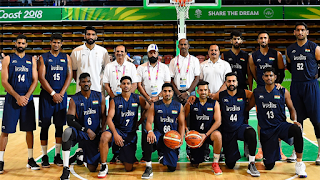India were grouped in the preliminary round of the 2019 FIBA World Cup Asia Qualifiers with Jordan, Lebanon, and Syria. The former two - higher ranked sides with notable star players - began as favourites over India even before the players took the court. But there was hope that India could finish ahead of Syria, a country with sporadic and limited basketball experience relative to India's, and without the perceived quality of some of the top players that India could potentially field for the matchup.
Alas, India's qualifiers campaign was a disaster, as the team lost all six of their home and away games to finish bottom of the group and missed the opportunity to step into the next round. The most disappointing of these losses came against Syria, to whom India fell 74-57 at home in Bengaluru in November 2017, and then again 81-76 on the road in Zouk Mikael in June 2018.
The losses, and the backroom turmoil that accompanied them with the Basketball Federation of India (BFI), were part of one of the worst stretches of results in recent Indian men's basketball history. India lost every game in every major tournament for nearly two years, including the FIBA Asia Cup, the aforementioned World Cup Qualifiers, and the Commonwealth Games. The team was helmed by a carousel of head coaches during this stretch without finding long-term stability with any single one.
In contrast to India's failure stood the surprisingly emerging Syrian side. Coahed by veteran Serbian coach Veselin Matic, Syria were able to move on to the second round of the World Cup qualifiers, and despite losing all the games at this tougher stage, they managed to put the Asian basketball fray at notice.
And noticing from the far end of the bench were Syria's disappointed victims: India. Nine months after they were knocked out by Matic's men, India have turned to a new saviour to help turn around their basketball fortunes: Matic himself.
At the most-recent Annual General Meeting of the BFI in Bengaluru, the federation's Secretary-General Chander Mukhi Sharma announced that Matic has been appointed as the new head coach of India's senior men's basketball team, replacing a series of interim/temporary coaches. Sharma stated that Matic is expected to begin his stint in India by the end of April.
The annoucement came during the BFI's AGM elections where K. Govindraj was again elected as the Federation's president.
According to a report by Sportstar, Govindraj was confident of improvement under the new head coach. "We will have aggressive camps. We have already appointed a foreign coach (Matic). We will do much better in the coming years."
Matic (58) is a veteran of European and Asian basketball and arrived in India with a wealth of successful international experience. Originally from Belgrade in Serbia, Matic spent his professional playing career as a guard for the Serbian club OKK Beogard. He even applied for the NBA Draft in 1982 but went undrafted. After retirement in 1988, Matic turned his attention to coaching, starting with his team Beogard. Over the next few decades, he held coaching roles for clubs in Germany, Poland, Estonia, Lebanon, and more, while also becoming a part of the national basketball coaching/scouting structure of the former Yugoslavia and the Polish national team. He was an assistant coach for Yugoslavia's squads that won the 2001 EuroBasket and the 2002 World Championship.
Matic served as the head coach of Iran's national team from 2009-2011, and during this stretch bagged the gold medal at the 2009 FIBA Asia Cup and bronze at the 2010 Asian Games. He served brief stretches as the head coach of Lebanon, and most recently, of Syria. Since 2012, he has been an official FIBA scout for the FIBA Men world championships.
Matic's wealth of experience is sure to be invaluable for the federation and players in India. Over the past 30 years, he has been a part of nearly every type of basketball situation. Although no details of his contract are yet confirmed, the BFI should retain him for the long-term to give the entire basketball framework a chance to grow and develop under his wing. The country's top players like Amjyot Singh, Amritpal Singh, Vishesh Bhriguvanshi, Satnam Singh, and more should benefit under his tutelage and be able to use his network to propel their individual careers to new avenues.
Indian basketball has seen some dark days in recent years. The Matic hiring isn't an instant game-winning shot, but it is a sign of a positive rebuild that should bring the sport back to its proper trajectory.




































